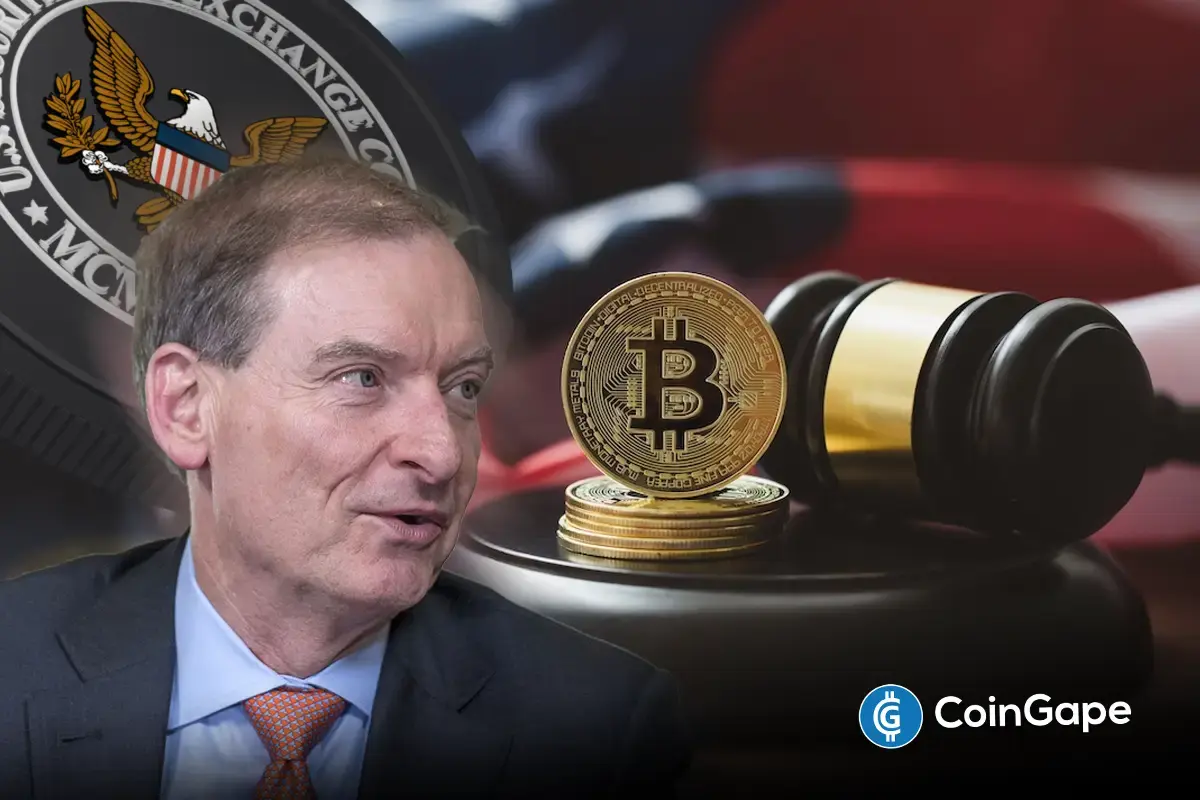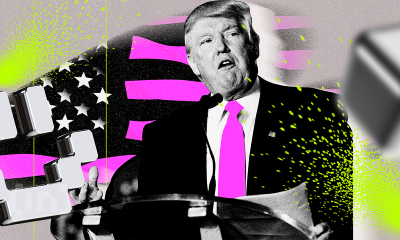Regulation
Elizabeth Warren Urges Fed Chair Jerome Powell To Cut Interest Rates

In a recent letter to Federal Reserve Chair Jerome Powell, U.S. Senators Elizabeth Warren, Jacky Rosen, and John Hickenlooper have urged a reduction in the Fed interest rate. The Fed interest rates currently stand at a two-decade high of 5.5 percent. The senators argue that the high interest rates are exacerbating the economic burden on working Americans.
Senator Elizabeth Warren Cites EU Rate Cut
The pressure on Americans comes particularly in terms of housing and auto insurance costs. Moreover, this plea of a Fed rate cut comes amid a global trend of central banks cutting rates. Notably, the European Central Bank recently decreased its rates from 4% to 3.75%, further widening the rate gap between Europe and the U.S.
Hence, the senators suggest a similar move in the U.S. “The Fed’s decision to keep interest rates high continues to widen the rate gap between Europe and the U.S.,” wrote the senators. They added, “The lower interest rates could push the dollar higher, tightening financial conditions.”
Warren along with other senators contended that the the current Fed policy is counterproductive. Furthermore, they asserted that it drives up the costs of housing and auto insurance, which are major contributors to inflation.
Since March 2022, the Federal Reserve has raised interest rates by a staggering eleven times. Thus, the nation witnessed the highest Fed interest levels in over 20 years. Despite growing calls for rate cuts from economists and legislators, the Fed has maintained its stance, sparking fears of further economic strain. In their letter, the senators highlight the adverse effects of high interest rates on the housing market.
They argue that the country’s severe housing shortage is being worsened by the Fed’s policies, which are keeping mortgage rates elevated. They added, “Lower mortgage rates would encourage more people to sell their homes, which would in turn increase housing supply, decrease prices, ease the costs of renting, and ultimately increase homeownership.”
Also Read: Bitcoin (BTC) Price Hits Weekly Low Before Fed Rate Cut Decision, More Pain Ahead?
Current Monetary Policy Is Not Effective In Curbing Inflation
On the issue of soaring auto insurance rates, the senators note that several factors are contributing to the increase. These include a shortage of mechanics, more severe and frequent car accidents, climate change impacts, and more complex vehicles that are costlier to repair. “None of these factors are mitigated by high interest rates,” they emphasized.
Furthermore, the letter reflects a broader concern among some lawmakers that the Fed monetary policy is not effectively curbing inflation. They believe that it is, in fact, contributing to economic instability. The U.S. senators argue that high interest rates are threatening the economy and risking a recession.
“Indeed, it is driving up housing and auto insurance costs—two of the key drivers of inflation—threatening the health of the economy and risking a recession that could push thousands of American workers out of their jobs. You have kept interest rates too high for too long: it is time to cut rates,” the senators concluded.
Senator Elizabeth Warren has been particularly vocal about the negative impacts of the Fed’s interest rate hikes. In March 2024, she and Senator Sheldon Whitehouse expressed concerns that the rate hikes had halted the deployment of clean energy technologies and undermined the Inflation Reduction Act’s climate and consumer benefits.
Earlier this year, Senators Warren, Hickenlooper, Rosen, and Whitehouse jointly called on the Fed to reverse its interest rate hikes, citing the detrimental effects on affordable housing. In addition, Senator Warren has consistently challenged Fed Chair Powell on the monetary policy.
She has highlighted the disproportionate impact on marginalized communities and warned of the broader economic risks. For instance, in a July 2023 letter, she raised concerns about rising unemployment rates among Black workers, attributing this trend to the Fed’s policies.
Also Read: Tech and Crypto Stocks Rebound Ahead of Fed Meeting
The presented content may include the personal opinion of the author and is subject to market condition. Do your market research before investing in cryptocurrencies. The author or the publication does not hold any responsibility for your personal financial loss.
Regulation
Kentucky Governor Signs Off On ‘Bitcoin Rights’ Bill, Strengthening Crypto Protections


In what is being dubbed a major development in the crypto regulation space, the Governor of the US state of Kentucky, Andy Beshear, has signed the ‘Bitcoin Rights’ bill into law. The law promises to safeguard protections for Bitcoin (BTC) users.
Bitcoin Rights Bill Comes Into Effect
Crypto regulations continue to evolve under pro-crypto US President Donald Trump’s administration. In the latest development, Kentucky has become the newest state to enshrine protections for digital asset users.
In an X post published on March 24, crypto advocacy group Satoshi Action Fund announced that Governor Beshear had signed the much-anticipated Bitcoin Rights bill into law. The post stated:
The right to self-custody, run a node, and use of digital assets is now protected for millions of Americans without fear of discrimination.
The bill was first introduced to the Kentucky House by Rep. Adam Bowling on February 19. According to the bill’s description, it seeks to safeguard users’ rights to use digital assets and self-custody wallets. Additionally, it aims to prohibit local zoning changes that discriminate against crypto mining operations.
The legislation outlines guidelines for running a digital asset node and excludes digital asset mining from money transmitter license requirements. It also clarifies that crypto mining or staking is not considered an offer or sale of securities.
On February 28, the bill passed Kentucky’s House of Representatives with a unanimous vote of all 91 representatives in favor. It later passed the Kentucky Senate on March 13, receiving backing from all 37 senators.
Kentucky’s proactive stance toward cryptocurrencies isn’t new. Earlier this year, the state became the 16th US state to introduce legislation seeking to create a Bitcoin strategic reserve.
Meanwhile, neighboring state Arizona is also joining the crypto movement. A recent X post by Bitcoin Laws revealed that Arizona’s House Rules Committee has passed two Bitcoin reserve bills — SB1373 and SB1025. These bills will now head to a full floor vote.
Renewed Optimism Under Trump Administration
Following Trump’s victory in the November presidential election, cryptocurrency regulations in the US are evolving rapidly, with many states introducing legislation aimed at strengthening their digital asset ecosystems and attracting crypto businesses.
Positive changes in crypto regulations are encouraging industry businesses to expand. For instance, leading crypto trading platform Coinbase recently announced plans to hire 1,000 employees in the US.
The Trump administration has also witnessed several lawsuits being dropped against major crypto entities, including Kraken, Coinbase, Gemini, and others. At press time, Bitcoin trades at $87,399, down 0.2% in the past 24 hours.

Featured Image from Unsplash.com, chart from TradingView.com

Editorial Process for bitcoinist is centered on delivering thoroughly researched, accurate, and unbiased content. We uphold strict sourcing standards, and each page undergoes diligent review by our team of top technology experts and seasoned editors. This process ensures the integrity, relevance, and value of our content for our readers.
Regulation
US SEC Drops Charges Against Hawk Tuah Girl Hailey Welch

Hawk Tuah girl Hailey Welch, known for her association with the controversial $HAWK token, has been cleared of any wrongdoing after a lengthy investigation by the U.S. Securities and Exchange Commission (SEC). The SEC has decided not to press charges against Welch in connection with the rapid rise and subsequent collapse of the meme-based cryptocurrency.
US SEC Investigation Into Hawk Tuah Girl Concludes Without Charges
The SEC had launched an investigation into the $HAWK token after its dramatic price drop. The token, which was linked to Welch’s viral persona, initially saw a market cap surge to $490 million before crashing by over 90%. Investors who were impacted by the crash filed a lawsuit against those behind the project, alleging that the coin had been promoted and sold without proper registration.
Hawk Tuah girl Hailey Welch, who cooperated fully with the investigation, expressed relief after the SEC’s decision. “For the past few months, I’ve been cooperating with all the authorities and attorneys, and finally, that work is complete,” Welch told TMZ.
Her attorney, James Sallah, confirmed that the SEC had closed the case without any findings against her, adding that there would be no monetary sanctions or restrictions on Welch’s future involvement in cryptocurrency or securities.
This Is A Developing News, Please Check Back For More
Disclaimer: The presented content may include the personal opinion of the author and is subject to market condition. Do your market research before investing in cryptocurrencies. The author or the publication does not hold any responsibility for your personal financial loss.
Regulation
Sonic Labs To Abandon Plans For Algorithmic USD Stablecoin, Here’s Why

Barely a week after hinting at launching an algorithmic USD stablecoin, Sonic Labs is shuttering its plans. Sonic Labs co-founder Andre Cronje revealed that incoming stablecoin regulation in the US contributes to the change of stance.
Sonic Labs Makes U-Turn Over Algorithmic USD Stablecoin
In mid-March, Sonic Labs disclosed plans for a yield-generating algorithmic stablecoin for its blockchain. However, new developments in the US regulatory landscape are forcing the company to ditch its algorithmic stablecoin ambitions.
Sonic Labs co-founder Andre Cronje confirmed the change in direction via an X post following the release of the full draft of the STABLE Act by Congress for clearer oversight. According to the text, lawmakers are pushing for a two-year moratorium on algorithmic stablecoin, souring Sonic Labs plans.
Unlike mainstream stablecoins backed by fiat or other commodities, algorithmic stablecoins rely on smart contracts to maintain their peg. The 2022 implosion of Terra’s ecosystem following the de-pegging of its TerraUSD (UST) algorithmic stablecoin stunned regulators.
“We will no longer be releasing a USD-based algorithmic stablecoin,” said Cronje.
In a light-hearted note, community members teased potential strategies for Sonic Labs to sidestep incoming stablecoin regulation. Apart from the loophole of launching the algorithmic stablecoin before the regulation goes live, Cronje teased an algorithmic dirham that will be denominated in USD.
Industry Players Are Bracing For New Stablecoin Regulations
Stablecoin issuers are steeling themselves for incoming stablecoin regulations in the US. While the GENIUS Act and STABLE Act continue to inch forward, there are common denominators in both bills.
For starters, there is the requirement for equivalent reserves at a 1:1 ratio with both bills steering clear of algorithmic stablecoins. The White House is favoring the GENIUS Act over the STABLE Act as lobbyists rally to stifle the possibility of a Conference Committee.
Authorities are targeting stablecoin regulation to reach Trump in two months as issuers jostle for position. Tether, Circle, and Ripple are staking their claims to lead the US government’s ambitions to rely on stablecoins to maintain the dollar’s dominance.
Disclaimer: The presented content may include the personal opinion of the author and is subject to market condition. Do your market research before investing in cryptocurrencies. The author or the publication does not hold any responsibility for your personal financial loss.
-

 Bitcoin20 hours ago
Bitcoin20 hours agoBitcoin Price Could Surge To $95,000 — But Analyst Sounds ‘Bull Trap’ Alarm
-

 Market19 hours ago
Market19 hours agoDark Web Criminals Are Selling Binance and Gemini User Data
-

 Market16 hours ago
Market16 hours agoVitalik Buterin Promotes Ethereum Layer 2 Roadmap
-

 Altcoin16 hours ago
Altcoin16 hours agoExpert Predicts Listing Date For WLFI’s USD1 Stablecoin, Here’s When
-

 Market15 hours ago
Market15 hours agoGRASS Jumps 30% in a Week, More Gains Ahead?
-

 Bitcoin21 hours ago
Bitcoin21 hours agoEl Salvador’s Nayib Bukele Open to White House Visit
-

 Altcoin20 hours ago
Altcoin20 hours agoDid XRP Price Just Hit $21K? Live TV Display Error Goes Viral
-

 Altcoin14 hours ago
Altcoin14 hours agoPepe Coin Whale Sells 150 Billion Tokens, Price Fall Ahead?
























✓ Share: